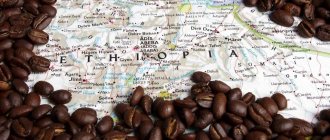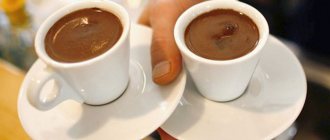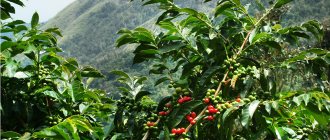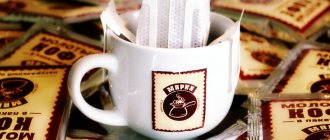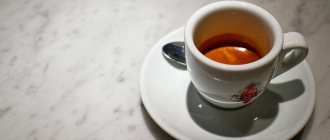Updated: 06/18/2018 12:45:00
*Review of the best according to the editors of expertology.ru. About the selection criteria. This material is subjective in nature, does not constitute advertising and does not serve as a purchase guide. Before purchasing, consultation with a specialist is required.
A cup of coffee for tomorrow or during a break from work is a sacred ritual for millions of people around the globe. Manufacturers and sellers of this drink take advantage of this: they are constantly expanding their range, offering new varieties and their combinations, and creating new forms of serving. On the shelves in stores there are bags, jars and boxes from the most budgetary to the most expensive, but does the price always correspond to the quality?
When compiling the rating of the best coffee brands, EXPERTOLOGY experts selected the best manufacturers from different points of view: the raw materials used and their processing, recognition, company reputation, the most significant facts are, of course, reviews from consumers and, importantly, professional coffee lovers and baristas.
Types of coffee you need to know about
When choosing an invigorating drink, first of all you need to pay attention to the variety that determines the taste. There are a huge variety of plant species, but 98% of the masmarket is filled with two:
- Arabica
- the most valuable species, cultivated in 50 countries of the world, its share in the consumer market is about 70%. Depending on the region where the plants are grown, the flavors of the future drink change. The most valuable variety is the Brazilian Bourbon Santos, and there are about 45 of them in total. The general characteristics of Arabica are a rich and bright taste, the drink has little caffeine, the beans are distinguished by their deep color and glossy surface.
- Robusta
- This is African coffee with a lot of caffeine, the drink is strong and invigorating, but with a bitterness. The taste of the species is unsaturated and unusually dull, so the Robusta variety is not used in its pure form; Arabica is added to the theme. Share in the mass consumption market is about 20%.
- Arabica and Robusta
- these are the types of coffee that can be found on supermarket shelves in any form: ground, freeze-dried, grain, and now in capsules for coffee machines. The cost of the products is considered acceptable in terms of the complexity of growing trees and the duration of harvest ripening. Varieties grown in smaller quantities for true connoisseurs, which occupy 10% of total consumption, will cost more. Among the most famous:
- Coffee Yauco Selecto
- a variety of Arabica from the Caribbean islands.
- Starbucks
– a type of coffee from the same producer. The taste is distinguished by sourness and spicy aroma.
- Blue Mountain
– coffee without bitterness, but with a rich taste. It grows in Jamaica and costs about $100 per kilogram.
When choosing coffee products, in addition to the variety, you can rely on the importing country where the plant was grown:
- Brazil
is the leader in coffee production in the world; most brands purchase beans from this South American country. A variety of Arabica varieties (more than 40 types), high quality raw materials have made Brazilian coffee one of the best.
- Colombia
supplies the market with grains, from which drinks are lighter with a fruity tint.
- Kenya
is equally leading in tea and coffee cultivation. An invigorating drink made from Kenyan grains combines strength and light currant shades with a slight sourness.
- Guatemala
supplies small harvests of coffee due to small territories, but this is what makes the product unique: Guatemalan varieties are intended primarily for gourmets and connoisseurs, rather than for the masmarket.
The same grains can be purchased by different manufacturers, who process the product in different ways using their own technologies, so the drink made from granules, roasted grains or ground powder is different for all brands.
Elite and rare coffees
The price of elite coffees is always very high, and they are also quite rare guests on supermarket shelves. On the global coffee market you can most often see:
- World number one Blue Mountain from Java;
- Indonesia's best coffee, Old Java, whose beans are aged for several years;
- Kopi Luwak with its exclusive production by passing through the intestinal tract of the small animal Musang;
- The highest grade of Galapagos San Cristobal coffee, harvested on the Galapagos Islands, where the trees are irrigated with the purest spring water from local lagoons.
Rating of the best coffee brands
| Nomination | place | Name of product | rating |
| The best brands of coffee beans | 1 | Lavazza | 4.9 |
| 2 | Paulig | 4.8 | |
| 3 | Vergnano | 4.8 | |
| 4 | Jamaica Blue Mountain | 4.7 | |
| 5 | Molinari | 4.7 | |
| 6 | CARRARO | 4.6 | |
| Best Instant Coffee Brands | 1 | Bushido | 4.9 |
| 2 | Egoiste | 4.8 | |
| 3 | Ambassador | 4.8 | |
| 4 | Carte Noire | 4.7 | |
| 5 | Nescafe | 4.6 | |
| 6 | Jacobs | 4.5 | |
| Best Ground Coffee Brands | 1 | Illy | 4.9 |
| 2 | Julius Meinl | 4.8 | |
| 3 | Caracolillo | 4.8 | |
| 4 | Diemme | 4.7 | |
| 5 | Manuel | 4.6 | |
| 6 | Danesi | 4.5 | |
| The best brands of coffee capsules | 1 | Nespresso | 4.9 |
| 2 | Nescafe | 4.8 | |
| 3 | Tassimo | 4.7 |
The best brands of coffee beans
All types of coffee are obtained from beans that are roasted during processing, then crushed, sublimated, etc. But even without factory processing, beans are in demand: they are ground in a coffee grinder and brewed, many coffee machines do this in one program cycle. This way you get a flavorful and rich drink. The grains are convenient to store and retain their taste much longer than powder ground in a packet.
The grain acquires the taste and aroma properties familiar to the consumer during the roasting process, which different manufacturers use their own technology: the temperature, heating time and other technological indicators differ.
Lavazza
Rating: 4.9
The Italian coffee brand occupies a leading position in the ranking category due to its wide recognition among gourmets. Premium quality beans make delicious drinks for every taste. The Lavazza line includes products from American and Asian certified plantations, single varieties and their combinations, which provides a wide range of flavors for consumers with any preferences.
The cost of grains produced by Lavazza corresponds to the price and depends on the variety; on average, in retail outlets, products can be purchased from 1,500 rubles per 1 kilogram, in online stores from 1,300 rubles per kg.
Advantages
- Wide flavor palette;
- Grains from certified plantations around the world;
- Many varieties used in pure form and in combinations;
Flaws
- High price.
Paulig
Rating: 4.8
European coffee brand Paulig took second place in the ranking. The product line includes bean coffee of varying degrees of roasting, mainly from the South American continent. According to coffee lovers, the drinks are moderately aromatic and come in a variety of flavors; the beans are used in many popular coffee shops. The cost of grains depends on the variety and the batch supplied, but usually does not exceed 1000 rubles per 1 kilogram.
Advantages
- Wide range of grains for every taste;
- Reasonable price.
Flaws
- The taste of the coffee is not outstanding, noted by lovers as average, but quite satisfactory.
Vergnano
Rating: 4.8
A special feature of the Italian trade coffee brand Vergnano is the combination of different types of beans to produce drinks with a variety of taste characteristics. The product line includes not only blends, but also pure Arabica coffee. In general, drinks for every taste can now be brewed not only in a coffee shop, but also at home, without feeling much difference.
Advantages
- Interesting blends;
- Coffee from different parts of the world.
Flaws
- High price of products, on average from 1800 rubles per kilogram.
Jamaica Blue Mountain
Rating: 4.7
A special variety of Jamaica Blue Mountain coffee, originally from Jamaica, has an unusual bluish color of the beans, but to enjoy it, you need to buy an unroasted product.
Blue Mountain is one of the elite coffee varieties recognized by gourmets. The grains are packed in a woven bag or wooden barrel. In the latter case, saturation with additional aromas occurs and the taste of the drink subsequently acquires unusual notes. Such packaging, as well as relatively small harvest volumes and multi-stage quality checks, affect the cost of the product - about 4,000 rubles per 250 grams. For this reason, Jamaica Blue Mountain ranks only fourth in the ranking.
Advantages
- Special varieties of Arabica beans cultivated only in Jamaica;
- Unusual taste worthy of gourmets;
- Presentable packaging;
Flaws
- Price.
Molinari
Rating: 4.7
Another Italian coffee brand is Molinari. The products are distinguished by unusual blends: the collection includes such unusual combinations as 5 stars (harvests from different continents), Arabica + Robusta, combinations with green coffee.
During production, each batch undergoes strict technological selection; the product is packaged in vacuum packaging or sealed tin cans. In both cases, the taste and aroma properties of the grain are perfectly preserved for a long time.
Original Italian coffee costs a lot, but is relatively decent - from 750 rubles for 250 grams.
Advantages
- Unusual combinations of varieties;
- Bright taste properties;
- Interesting packaging, worthy of a gift;
Flaws
- Price.
CARRARO
Rating: 4.6
CARRARO coffee is a budget option for an invigorating drink that has received praise from a wide range of consumers. The product line includes different blends from deeply roasted bitter beans to medium-heated sweet beans with a chocolate tint.
Despite the affordability of coffee (a 250-gram pack costs an average of 300 rubles), the taste of the drinks is in no way inferior to the leaders in the rating; judging by the reviews, the cost is due to the use of mass-produced varieties of Arabica, collected and processed industrially.
Advantages
- Relatively low price;
- Coffee for every taste.
Flaws
- Some consumers note not the most vivid taste impressions.
What does elite mean?
The word elite always means something rare, of the highest quality and unusual characteristics. Most often this word is combined with the concept of wine, coffee, chocolate, when talking about food products. Elite coffee is a rare product that is produced in limited quantities, has constant characteristics and a high price. Constancy of characteristics means stable taste and aroma, identical grain sizes.
Typically, such a product has a regular buyer or buyers who carefully check the quality, sort, transport and process the products themselves. Arabica has always been considered elite. It is this type of tree that produces coffee beans, which are distinguished by a pleasant aroma, bright taste and rich foam when preparing the drink.
Elite coffee beans are a product that has always been preferred by gourmets, although there are many manufacturers on the market offering high-quality ground and even instant coffee. Arabica has dozens of different varieties that differ in caffeine content, antioxidants, taste and aromatic properties.
The coffee tree, like the grapevine, reacts strongly to climatic conditions, soil composition, proximity to other plants, and altitude. That's why there are so many varieties of coffee. Some are distinguished by pronounced sourness, others by bitterness, others by chocolate or nutty notes, and so on. The important thing here is to find your taste and enjoy it as much as you like.
Best Instant Coffee Brands
In conditions of limited time or in the absence of a coffee machine, instant coffee comes to replace grain coffee - just mix a spoonful of powder with boiling water and the aromatic drink is ready.
To obtain a soluble powder that does not require brewing, the grains are first fried in production, then crushed, the soluble components are washed out of the particles using water (extraction process), then the moisture is evaporated in one of two ways:
Under the influence of hot air, agglomerate granules are obtained;
Sublimation with preliminary freezing of the wet extract and grinding it into solid form. Next, water is removed from the granules using a vacuum. It turns out to be freeze-dried coffee.
The taste of evaporated and freeze-dried coffee is almost the same, but the price of the first is slightly lower than the cost of the second type of product.
Bushido
Rating: 4.9
The brand, originally from Switzerland, is considered one of the best in terms of the quality of the coffee product. Bushido offers mainly freeze-dried coffee in varying degrees of pre-roasting and combinations of different varieties. These properties can be seen in a glass jar upon purchase: in one container there are uniformly colored granules, in the other - different shades.
The taste of Bushido drinks, judging by the reviews, repeats the sensations of brewed coffee from professional baristas, which indicates the high quality of the product, which corresponds to the price - from 305 rubles for 50 grams.
Advantages
- Rich taste and aroma like bean coffee;
- High quality from Switzerland;
- Transparent jar for better presentation of freeze-dried coffee.
Flaws
- The price of 300 rubles per 50 grams is considered high.
Egoiste
Rating: 4.8
It is no coincidence that Egoiste freeze-dried instant coffee is known as a high-quality product: elite Kenyan, Guinean, Colombian varieties of Arabica, Robusta and their combinations are used to make the product; the blends perfectly balance all shades of taste: bitterness, sourness, additional notes of fruit. The diversity is due to the different degrees of roasting and the varieties used from around the world, which is why Egoiste takes second place in the ranking in the instant coffee category.
With such advantages, the cost of the product starts from 300 rubles per 100 grams in a glass jar.
Advantages
- Elite varieties of coffee beans;
- Acceptable price;
- Aesthetic packaging design;
- Impeccable taste and aroma.
Flaws
- Not defined.
Ambassador
Rating: 4.8
This brand of coffee is known to the general consumer due to its availability in almost all chain supermarkets, and you can buy it inexpensively - from 118 rubles for 75 grams in a sealed bag, a glass jar with a product weight of 95 grams will cost about 200 rubles.
Ambassador freeze-dried coffee is made from Colombian Arabica beans. The line includes products with low caffeine content (Decaf), extracted from green beans before roasting.
Advantages
- Affordable price;
- High-quality Colombian Arabica raw materials;
- There is coffee with low caffeine content;
- Variety of packaging.
Flaws
- The line contains only Arabica coffee, no blends.
Carte Noire
Rating: 4.7
The well-known brand Carte Noire presents freeze-dried and crystallized coffee, the latter being a unique product of the brand that undergoes special technological processing. The drinks are surprisingly rich in taste and aroma, varied due to the use of raw materials from different parts of the planet. Arabica is used solo and in blends of different varieties.
The cost of Carte Noire coffee is affordable for the masmarket and is approximately 350 rubles for 95 grams in a can, in a bag and in portioned sticks, somewhat cheaper.
Advantages
- A variety of Arabica beans in solo and blends;
- Affordable price;
- Decent taste and aroma properties.
Flaws
- Jars with high lids are massive, which causes some inconvenience during storage and transportation.
Nescafe
Rating: 4.6
The world-famous Nescafe brand specializes in coffee and has a wide range of freeze-dried drinks, as well as granulated drinks evaporated at high temperatures. The cost of the product is budget, Nescafe Classic can be bought from 115 rubles for 75 grams in a bag.
According to consumer reviews, there is dissatisfaction with the degree of roasting of coffee in some batches of the product, this is especially noticeable in the Nescafe Classic mentioned above. But other drinks are decent.
The love of coffee lovers is determined by the wide range of blends of Arabica and Robusta varieties from all over the world; expensive varieties for the mass market are practically not used.
Advantages
- Budget brand;
- Variety of coffee collections;
- Availability in all supermarkets;
- Constantly replenished collections of the line.
Flaws
- A violation of the production technology was noticed, in particular – overcooking.
Jacobs
Rating: 4.5
Jacobs coffee has virtually no quality complaints from consumers. The brand is also known throughout the world; mainly Arabica beans from Asia, Africa and South America are used for production.
Like Nescafe, the Jacobs brand is designed for a wide audience of consumers, so the price of the product is affordable: from 180 rubles for a 95 gram can. The latter receives last place in the instant coffee category due to the higher price and less modest product line of the freeze-dried invigorating drink.
Advantages
- Optimal product quality, noted by coffee lovers;
- Relatively affordable price;
- Convenient packaging.
Flaws
- A limited range of instant coffee compared to the higher-ranking brands.
Coffee from Vietnam
First of all, this concerns coffee from Vietnam, which caring tourists bring from their travels and say something like “this is straight from the plantation, and not what they sell here.” And there are a lot of misconceptions here.
Firstly, mostly Robusta grows in Vietnam, and this type of coffee is inferior in taste to Arabica. Probably because of this, in Vietnam they brew it and drink it with condensed milk, and not in a filter, and not in espresso. Secondly, it is not clear who and how fried it there. After all, Vietnamese roasters do not win world coffee roasting championships. Russian roasters have won this championship two times in a row. And thirdly, roasted coffee does not survive airplane flights very well. Due to the pressure difference, almost all the aroma of the coffee is sucked out during the flight, and the pack of beans becomes like a vacuum package. Therefore, the best way to try Vietnamese coffee is to find Arabica beans from Vietnam in the assortment of a local roaster and buy it.
Best Ground Coffee Brands
Ground coffee is obtained by grinding roasted beans. Using ready-made powder, you can save time on grain processing and immediately start brewing the drink. It is worth noting that a ground product loses its flavor much faster than a freeze-dried or grain product, so you should not purchase it in stock; you need to calculate your desires and capabilities so as not to lose quality and pleasure over time, respectively.
Illy
Rating: 4.9
Illy is a brand that offers a variety of ground coffee in varying degrees of roast from medium to dark. The manufacturer uses 9 types of high-grade Arabica coffee from different countries (Costa Rica, Brazil, Ethiopia, Kenya, Guatemala, Jamaica) and packages the product in sealed metal cans and pods - individual portioned bags of pressed ground coffee, convenient for quickly making espresso.
To get a special pleasure while drinking coffee, the Illy brand has released a series of special tableware with a pleasant personalized design. The variety of flavors combined with high quality earned the Italian manufacturer first place in the ranking of ground coffee.
Advantages
- Various high quality Arabica varieties;
- Degrees of roasting for every taste;
- Convenient sealed containers and portioned bags.
Flaws
- Price from 450 rubles for 125 grams of powder in a tin.
Julius Meinl
Rating: 4.8
The Austrian tea and coffee brand Julius Meinl presents a line of coffee that includes Arabica and Robusta blends. The products are distinguished mainly by the degree of roasting from gentle, giving the drink soft coffee shades, to dark for lovers of a strong and bright taste.
The ground powder is supplied in metallized vacuum packaging, thanks to which the taste and aroma are preserved for a long time.
Julius Meinl also offers a signature line of tableware for coffee ceremonies.
Advantages
- Degree of roasting of grains from light to dark;
- A combination of high quality Arabica and Robusta;
- Compact and reliable packaging;
- The optimal price is from 300 rubles for 250 grams.
Flaws
- There is no coffee in cans; metal containers are purchased separately and are used only for storing powder.
Caracolillo
Rating: 4.8
The overseas Cuban brand Caracolillo offers coffee lovers around the world high-quality ground Arabica beans from the South American continent, growing in the Sierra del Rosario nature reserve. The product has different degrees of roasting, but a predominantly dark version comes to the European market for lovers of strong invigorating drinks with a bright, pronounced taste, balanced bitterness and sourness.
The cost of the product is determined by the specifics of cultivating the special varieties of coffee trees used by the Caracolillo enterprise: the harvest occurs only once a year, so this coffee is considered unique and especially valuable, its cost averages from 400 rubles per 250 grams. This rarity also affects availability in stores: the product is not found in all retail outlets, for which it receives only third place in the rating category.
Advantages
- Coffee from rare Arabica varieties grown in an ecologically clean reserve;
- Intensive roasting to obtain an invigorating drink with a bright taste.
Flaws
- High price due to imports and rare harvest.
Diemme
Rating: 4.7
Italian Diemme coffee is loved by many coffee lovers for its unique flavor and aroma bouquet, determined by different blends of Arabica coffee from El Salvador, Nicaragua, Ethiopia, Brazil and other countries. The different degrees of roasting and grinding also contribute to the coffee ceremony experience. The blends are distinguished by the presence of fruity and floral notes in the taste, pleasant sourness and bitterness with a unique aftertaste.
Arabica Diemme is recognized by experts as one of the best among ground coffee, but the brand receives fourth place in the ranking due to its narrow product line and high price - from 800 rubles per 250 grams.
Advantages
- Unique taste;
- Arabic blends from different countries;
- Characteristic floral and fruity notes and a pleasant aftertaste.
Flaws
- High price.
Manuel
Rating: 4.6
Manuel ground coffee is available in a wide range of different blends of famous high quality Arabica varieties. It is noteworthy: the manufacturer conventionally divided the ground beans into powder for professional and home use, thus making the task easier when choosing coffee for coffee shops and home preparation. The difference lies in the selection of the product for its maximum disclosure in specific conditions: in a car or in a Turk.
Manuel is a blend of Arabica and Robusta of varying degrees of grinding and roasting in convenient tin or vacuum packaging. Only the price is somewhat scary - from 890 rubles for 250 grams of product, so only fifth place in the ranking.
Advantages
- Ground coffee of varying degrees of grinding and roasting;
- Interesting additional fruit notes on the palate;
- Wide range and convenient packaging.
Flaws
- Price.
Danesi
Rating: 4.5
A family coffee company from Italy makes Danesi coffee from high quality Arabica beans from the world's best plantations. Tin packaging or pods - choose according to your convenience, and designer ceramic tableware will make the coffee ceremony especially enjoyable.
Danesi products are distinguished by the presence of non-standard notes in taste: lemon, chocolate, caramel - the aftertaste gives unexpected effects. The degree of roasting determines the nature of the notes and flavor harmony of the coffee drink.
For the pleasure you will have to pay about 750 rubles for 250 grams of ground grains.
Advantages
- Coffee with a unique aftertaste;
- Convenient packaging to choose from.
Flaws
- Price.
The most elite coffee
The very first myth is the belief that there is some kind of elite coffee. That is, a kind of premium coffee from the world's best producer. This coffee is grown only in one specific place, and it reaches customers in a beautiful package with a bunch of inscriptions in a foreign language and a mention of something about Italy. You can’t just buy it in a store, because they don’t really sell the best and most expensive varieties of coffee in the world. Therefore, elite coffee has to be obtained in roundabout ways: through friends and acquaintances who can bring it from another country, or in dubious stores.
As you probably already guessed, this is all a myth and competent work of marketers. The most delicious coffee is freshly roasted coffee. Therefore, you need to buy coffee from local roasters. But you probably recognized some situations from your life in this description. So, in fact, the world has already invented a system for evaluating beans, so all high-quality coffee is called not elite, but specialty. Each specialty grain is not abstractly “elite”, but has a certain number of points. Points are awarded for the brightness of taste and aroma, absence of defects and other characteristics. The very moment you try to find out how many points a supposedly elite coffee has, the marketing legend shatters into a million little tricks and stops working.
The best brands of coffee capsules
Capsules are a relatively new form of the coffee industry. Separate blocks made of polymer or aluminum contain coffee concentrate, which at a certain temperature under pressure is mixed with water in a special capsule machine. The protective packaging is opened only in the machine to ensure complete safety of the semi-finished product and prevent its premature oxidation.
Convenient form for sale and preparation (no more than 1 minute from starting the start to filling the cup), but the price is frustrating - coffee in capsules is considered the most expensive per serving. This is a common drawback of this type of product.
Nespresso
Rating: 4.9
Nespresso is a huge enterprise specializing in the production of capsule coffee machines and the capsules themselves with an invigorating drink concentrate, as well as the necessary accessories for caring for this equipment.
The line includes a huge number of coffee capsules with different taste characteristics, due to the use of unique varieties of beans from all over the world and their unique blends, a total of 24 types, distinguished by the color of the polymer packaging.
You can purchase capsules individually or in sets of different configurations and sizes. This is a great gift for any occasion.
The price of one capsule starts from 33 rubles.
Advantages
- A variety of variations of different types of coffee;
- Convenient identification of capsules by color;
- Interesting sets of different sizes.
Flaws
- Not defined.
Nescafe
Rating: 4.8
The coffee brand did not ignore the global sensation and introduced Dolce Gusto capsule coffee from different varieties of Arabica in the classic form, espresso, Americano, Crema Grande, Latte Macchiato and others, as well as with caramel and chocolate fillings. Users note the unique and interesting tastes of the resulting coffee, which requires a Nescafe capsule machine to prepare.
The cost of one capsule starts from 36 rubles, which is higher than the cost of the leader in the rating, so Nescafe takes only second position in the category.
Advantages
- Variety of tastes;
- High quality product.
Flaws
- The price has been increased, non-classical types cost more than 40 rubles per serving.
Tassimo
Rating: 4.7
The brand of coffee capsules Tassimo closes the ranking. Its uniqueness is not just the variety of coffee flavors, but the use of products from different brands: Carte Noire, Jacobs and even Oreo, Milka (but this is cocoa). Cappuccino, espresso, strong drink - the variety is not so wide compared to Nescafe and Nespresso, but this way you can prepare your favorite coffee from different manufacturers.
It is also noteworthy that filling capsules does not require any special machine of one brand; you can choose from the Tassimo line of universal machines from Bosch. The cost of one capsule starts from 32 rubles.
Advantages
- A variety of drinks from different brands;
- No binding in one capsule machine;
- Optimal price.
Coffee from Italy
The situation is similar with elite coffee from Italy. Only in Italy, unlike Vietnam, there are not even plantations. But there is a story associated with the invention of espresso coffee machines and the standard for making espresso. It is believed that Italians know best how to properly roast coffee and make espresso. Of course, this is also a myth.
Italy is characterized by dark roasting, which means that all the tastes and aromas that nature put into the grain are killed in favor of caramelization and the texture of the drink. Since the beans are roasted to the point where each variety tastes roughly the same, it makes little sense for Italian roasters to spend money on expensive Arabica beans. Therefore, coffee from Italy in half the cases will not be one hundred percent Arabica. This will be a blend with Robusta. Well, the standard checks for the number of points and participation in world coffee roasting championships from Italy do not pass.
There are also questions about Italian espresso, because Italian baristas have not proven themselves in world championships. At the same time, Russian baristas can boast of reaching the finals. So all that remains is to admit that the culture of roasting and preparing coffee in Russia is now better developed than in Italy. And elite coffee from Italy is a myth.
